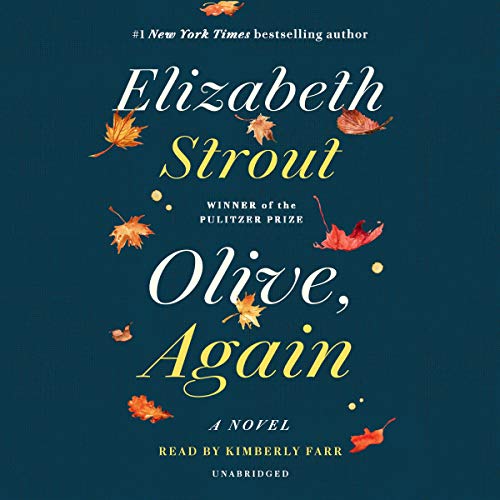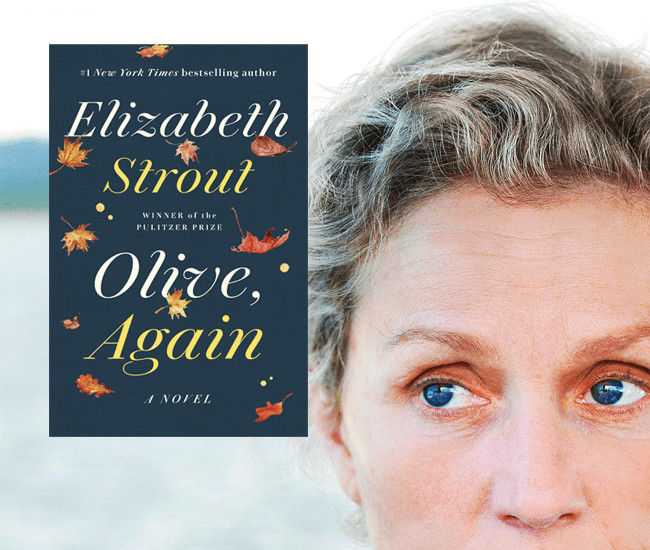Olive, Again by Elizabeth Strout
Olive Kitteridge is back and we are richer for it. Elizabeth Strout’s new novel Olive, Again (Random House)—sequel to her 2008 novel Olive Kitteridge that spawned the eponymous television mini-series and won a Pulitzer prize—is arguably better than its predecessor.
The story resumes with Olive in her mid-seventies still residing in fictional Crosby, Maine four years after her husband Henry has passed, and it follows the next decade of her life. In these new pages a still sharp-tongued Olive takes a breath to contemplate “sunrises, sunsets, the different hands of waitresses who had placed before her cups of coffee,” and rejoices at the sight of a new rosebud.
She gives sympathy to a daughter-in-law she has never liked and rough comfort to a cancer-stricken mother who struggles with the unfinished legacy she leaves for her family. But perhaps most poignantly Olive suffers bravely with the intimate indignities of an aging body and mind, and that new vulnerability makes us eager to soak up the wisdom of her raw honesty and fearless insight.
The book’s thirteen interconnected tales proceed chronologically, with Olive central to some stories and peripheral to others. Strout illuminates ordinary relationships and makes their issues visceral.
Both Olive and Jack Kennison—Olive’s suitor in the first book and second husband here—feel cut off from their grown children and clueless about how to connect except awkwardly. An empty-nested couple married forty-two years has lived thirty-five of them with yellow duct tape dividing their house since his affair. Their world gets torn open as their daughter shows up with a startling secret. The awakening sexuality of a seventeen-year-old girl unfolds in the presence of her male employer. A woman whose childhood house has just burned down with her estranged father in it hesitates to accept her large inheritance.
Providing a satisfying sense of closure, Strout includes characters from her previous novels—Jim and Bob Burgess from The Burgess Boys and Isabelle Daignault nee Goodrow from Amy and Isabelle—all three of whom yearn for meaningful connection in these later years of their lives.
The primary issues Strout addresses in this second book—loneliness, aging, measuring up—confound us all. She edifies the human to and fro between snobbery and feeling worthless. So what if you used to be somebody, ponders Jack. Now you are “just an old man with a sloppy belly and not anyone worth noticing.”
One of Olive’s former students shows up here as a grown woman with a messy life and tells Olive “I envy you for ever thinking you were something.” We root for Olive, and the rest, in those moments when they see their own value because we know it’s there. They run deep and true as authentic human beings who pine for a life more well-lived than theirs has been, crave rare connections with the family members they love and lean on their flawed—and aging—friends who understand life better than the young ever can.
Strout’s writing is at its exquisite best, with clarity of view and gloriously vivid metaphors, such as of the distance in one couple’s long marriage—“a stone wall that separated them but also provided unexpected dips of moss-covered warm spots where sunshine would flicker between them in a sudden laugh of understanding.”
Strout depicts the beauty of the outdoors in stunning passages: boats with “their thin masts pointing to the heavens like tiny steeples,” and Maine’s late February sunlight with its “open-throated look that came toward the end of the day’s light….It promised, that light, and what a thing that was.”
How wonderful that writers like Elizabeth Strout enable us to see this gorgeous world with fresh eyes and to appreciate that we share the same flawed humanity, no matter our age or color, and trust our mutual interdependence because we make each other better. Olive Kitteridge—attuned to life’s opportunities and limits—demands that we look honestly at our own selves and make our own inner peace with lives that have been imperfectly lived.
This summation of the human condition echoes as a main theme throughout the novel: “There is something much larger than we are… our job—maybe even our duty—is to … bear the burden of the mystery with as much grace as we can.” Amidst all her struggles, Olive shows us her grace with perfect clarity and we stand in awe.
Buy this Book!
Amazon




